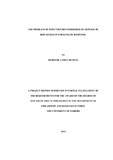| dc.description.abstract | Are we justified in believing that the future will be like the past? This is the
problem of induction that challenges the process of inferring future unobserved
claims from past observed claims as is the nature of scientific inquiry. This study
sets out to revisit the problem of induction by re-evaluating the main solutions
offered since its inception by David Hume in the 18th century. Several attempts
have been made to give an epistemic solution to the problem or in other terms to
validate induction. Epistemic solutions seek to show that the conclusions of
inductive arguments will be true in the future. However, the fact that induction,
unlike deduction, is not necessarily truth preserving has proved that validation of
induction is not possible for this would amount to equating induction with
deduction. In this regard, epistemic solutions to the problem of induction have
failed to meet the sought objective. However, Hans Reichenbach has offered an
alternative to epistemic justification of induction: pragmatic justification or
vindication of induction. Pragmatic justification or vindication of induction seeks
to show that induction is justified by virtue of being directed towards achieving a
desired aim. Reichenbach’s solution namely, that induction is justified by the fact
that it will eventually lead scientists to the true value of the limit of relative
frequency of repeatable events thus leading to predictive success, has been
criticized of not being an epistemic justification and hence is not in line with
Hume’s demand namely, that the justification of induction should seek to show
that the conclusions of inductive arguments will be true in the future. However,
given the apparent impossibility of validating induction, there is need to revisit
the problem of induction with an aim of defending the pragmatic solution. This
study establishes that the three main epistemic solutions to the problem of
induction namely, probabilistic, reliabilistic and inductive responses, are guilty of
circular reasoning. As such, they fail to meet the standards of an acceptable
justification of induction. Moreover the study shows that the linguistic and
falsificationism attempts to show that the problem of induction is a pseudo
problem do not succeed in dissolving the problem. On the one hand, the linguist’s
claim namely, that induction is rational by definition and thus justified, does not
entail an impossibility of further justification of induction since vindication is a
viable alternative. On the other hand, falsificationism, the alternative to induction
as the methodology of science, fails owing to the indisputable fact that science
makes use of induction. The study even shows that falsificationism appeal to
corroboration of theories, where the most corroborated theories are preferred to
the less corroborated ones, is a disguised concept of induction. In addition, the
study establishes that Nelson Goodman’s attempt to introduce a new problem of
induction namely that of distinguishing valid from invalid inductive projections
together with his attempted epistemic solution to it is nothing but Hume’s
problem in disguise. Hence, the study shows that Goodman does not advance the
debate beyond Hume’s assumptions. It is on these grounds that the study seeks to
establish that Reichenbach’s solution is more viable than any of the aforementioned solutions and from which philosophers can seek to advance the
debate. Further, Reichenbach’s solution is criticized on the grounds that this aim
may never be achieved either in the long or the short run. That even if the limit of
relative frequency is achievable, there is no way that scientists could know they
have arrived at it. To remedy this, the study has appealed to the immediate
practical consequences of induction without seeking an aim that is to be achieved
in the future as Reichenbach does. That is, induction sustains scientific
predictions in their application to current policy formulation and technological
advancement. | en_US |

